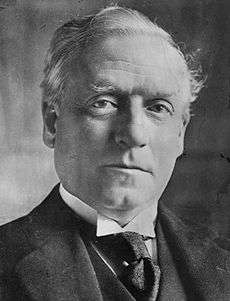Asquith coalition ministry
Liberal Prime Minister H. H. Asquith formed a wartime coalition government in May 1915. The change of ministry resulted from intense attacks on the Liberal government claiming it had badly mishandled the war effort, especially regarding the Gallipoli Campaign against Constantinople and the Shell Crisis regarding shortage of ammunition on the Western Front.
| Asquith coalition ministry | |
|---|---|
| 1915–1916 | |
 | |
| Date formed | 25 May 1915 |
| Date dissolved | 5 December 1916 |
| People and organisations | |
| Monarch | George V |
| Prime Minister | H. H. Asquith |
| Prime Minister's history | 1908–1916 |
| Total no. of members | 85 appointments |
| Member parties | |
| Status in legislature | Majority (coalition) |
| Opposition party | Opposition Conservative Party (1915–1916) |
| Opposition leader | Sir Edward Carson (1915–1916) |
| History | |
| Legislature term(s) | 30th UK Parliament |
| Predecessor | Third Asquith ministry |
| Successor | Lloyd George war ministry |
The new Cabinet included nine Conservatives and one Labour minister, but the Liberals continued to hold most of the important posts;[1] the Conservatives had demanded Cabinet seats, but they only received lesser positions. Not at all satisfied, Conservative Party leader and future Prime Minister Bonar Law, continued the verbal attacks.
The ministry collapsed on 5 December 1916 as a result of Conservative resignations, who refused to serve under Asquith's leadership. Asquith and most of the Liberals then moved into opposition, while the Conservatives formed a new coalition with a minority of Liberals, under the leadership of Liberal David Lloyd George, the next day.
Cabinet
List of ministers
Cabinet members are listed in bold face.
Notes
- Montagu entered the cabinet on 16 January 1916.
- Grey was created the 1st Viscount Grey of Fallodon on 27 July 1916.
- Cecil joined the Cabinet on 23 February 1916.
- Devonshire also served as Joint Government Chief Whip in the House of Lords.
- Crewe also served as Leader of the House of Lords.
- Hylton served as Joint Government Chief Whip in the House of Lords from 26 July 1916.
Citations
- Rubinstein 2003, p. 78–79.
References
- Adams, R. J. Q. '"Andrew Bonar Law and the fall of the Asquith Coalition: The December 1916 cabinet crisis," Canadian Journal of History (1997) 32#2 pp 185–200 online
- Adams, R. J .Q (July 1986). "Asquith's Choice: The May Coalition and the Coming of Conscription, 1915–1916". Journal of British Studies. 25 (3): 243–263. doi:10.1086/385864. JSTOR 175463.
- Butler, David; Butler, Gareth (2010). British Political Facts (10th ed.). Palgrave Macmillan UK. ISBN 978-0-230-29318-2.
- Cawood, Ian (10 May 2013). "Liberal–Conservative Coalitions – 'a farce and a fraud'?". History & Policy.
- Gollin, Alfred; Whitehall, S. W.; et al. (1976). "Freedom or Control in the First World War: (The Great Crisis of May 1915)". Historical Reflections. 2 (2): 135–155. JSTOR 41298664.
- Grieves, Keith (1988). The Politics of Manpower, 1914–18. Manchester University Press. ISBN 978-0-7190-2253-1.
- McEwen, J. M. (1978). "The Struggle for Mastery in Britain: Lloyd George versus Asquith, December 1916". Journal of British Studies. 18 (1): 131–156. doi:10.1086/385732.
- McGill, Barry (1967). "Asquith's Predicament, 1914–1918". The Journal of Modern History. 39 (3): 283–303. doi:10.1086/240083. JSTOR 1876582.
- Martin, Ged (1985). "Asquith, the Maurice Debate and the Historians". Australian Journal of Politics and History. 31 (3): 435–444. doi:10.1111/j.1467-8497.1985.tb00128.x.
- Pugh, Martin D. (December 1974). "Asquith, Bonar Law and the First Coalition". The Historical Journal. 17 (4): 813–836. JSTOR 2638558.
- Rothwell, Victor (1971). British War Aims and Peace Diplomacy, 1914–1918. Oxford: Clarendon Press.
- Rubinstein, William D. (2003). Twentieth-Century Britain: A Political History. Palgrave Macmillan. ISBN 023062913X. Retrieved 7 March 2016.CS1 maint: ref=harv (link)
- Searle, G. R. (1992). "Liberalism and the Great War". The Liberal Party. Macmillan Education UK. pp. 121–140.
| Preceded by Third Asquith ministry |
Government of the United Kingdom 1915–1916 |
Succeeded by Lloyd George war ministry |
.svg.png)